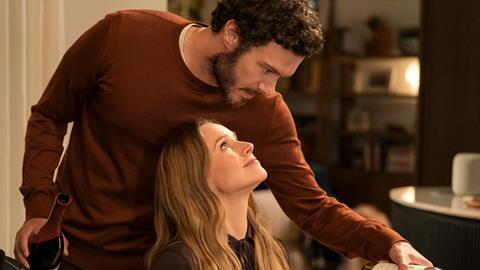As Nobody Wants This returns for a second season, Bex Chapman commends it as a refreshingly realistic portrayal of what happens when love crosses religious boundaries

What would you do for love? Forego a promotion? Fall out with your family? What about compromise your beliefs – or convert to someone else’s?
Last autumn, Netflix’s rom-com series Nobody Wants This hit our screens with a faith focus rarely seen on TV.
Set in sunny LA, Rabbi Noah (Adam Brody) had a dinner party meet-cute with agnostic relationships podcaster Joanne (Kristen Bell). The next ten episodes followed their ‘will-they-wont-they’ burgeoning romance – focussing largely on those around them who had concerns about their religious differences.
The recently-released second series features the same sparkling chemistry between the two leads, both icons of noughties teen TV. This time, the Jewish stereotypes have been dialled down, and more time allowed for the fantastic ensemble cast – which includes Brody’s real-life wife Leighton Meester and Seth Rogan as a progressive rabbi. It has all the lightness, froth and fun that you’d expect from a Netflix hit – I binge-watched the entire series on a single chilly afternoon!
Love conquers all
For the leading couple, the honeymoon phase is over. We see Noah and Joanne haltingly attempt to merge their lives, friends and cultures. At a dinner party, when asked if she’s going to convert to Judaism, Joanne immediately replies: “No…We are gonna do the whole interfaith thing” - but it’s clear Noah isn’t so sure.
When the Church of England marriage service asks family and friends to “support and uphold” a couple both “now and in the years to come”, it is a reflection of the reality that relationships don’t exist in a bubble. It felt good to watch a TV show that was aware of this - that support (or lack thereof) from your wider community makes a substantive difference to the likelihood of a relationship’s success.
It isn’t often that TV shows us how faith fits into the modern dating scene
Hollywood often tries to tell us that differences don’t matter. That love conquers all. That when you find your soulmate, they will choose you irrespective of any challenges. But despite Noah’s sincere declarations of love, pressure ramps up for Joanne to convert to Judaism. If you are converting principally in order to be with someone, are you really converting? Does your partner love you enough to make it work if they desperately want you to believe in something different? Noah’s sister assures Joanne that “you feel Jewish to me”, but can feeling Jewish to someone else mean you are one, any more than being a cultural Christian makes you an actual follower of Jesus?
Interfaith lessons
As any vicar’s spouse knows, the pressure ramps up even more if you are the partner of a faith leader. Leading isn’t just a job, it’s a vocation - and can often feel like it takes over your whole life. Other people will have all sorts of expectations, the community may (will?) judge you, even though you aren’t working for them, your partner is. One character says to Joanne: “He represents the temple, so you represent the temple. People look to you as an example.”
This second series also poses questions about how much modernisation is necessary – or acceptable – in a faith community to “get asses in seats”. Is providing spiritual sustenance and challenge the most important thing, or should the focus be on keeping things ‘fun’ to ensure people keep coming?
I found it encouraging to see various Jewish traditions depicted so warmly – Shabbat is informally celebrated, we see a brit bat, and while many Jews understandably struggle with the labelling of Purim as ‘Jewish Halloween’ in the manner it is shown here, the story of Esther does at least get a summary.
We also see a little bit of what it must be like to be Jewish in LA – akin to choosing a church community in any major city. There are hundreds of options available – from pop up synagogues to back-yard services. As Noah wrestles with finding the faith community that is just right for him, I imagine many Christians can relate.
As any vicar’s spouse knows, leading isn’t just a job, it’s a vocation
All the way back in 2003, Sex and the City storied Charlotte York’s relationship with Harry Goldenblatt. They were only able to marry after she converted – having overcome a rabbi’s initial rejection, gone through the necessary classes, said farewell to Christmas forever, and finally had her ceremony at the mikvah. She gave up a lot for love - and the whole thing was portrayed as an ongoing (eternal!) battle.
Thankfully, as Christians, coming to faith is about turning to a person – not romantically, but the person of Christ - and committing ourselves to following him. It isn’t often that we get a TV show that shows us something of how faith (of any kind) fits into the modern dating scene - nor one so realistic about the challenges of an interfaith relationship or dating a faith leader.
All this, and it’s fun and glossy TV, too. Surely everybody wants a third series. I know I do.






































No comments yet